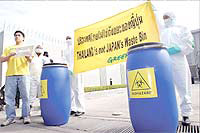FTA sparks toxic waste dump fears
by Apinya Wipatayotin & Kultida Samabuddhi, Bangkok Post (Thailand)
 |
 |
 |
 |
| |
 |
|
| |
Greenpeace activists gather in front of the Japanese embassy in Bangkok yesterday to protest against the Thai-Japanese free trade agreement which, they warn, will allow Japan to export hazardous waste to Thailand.
© Wisit Thamngern |
|
 |
 |
 |
|
| |
10 January 2007 –
Greenpeace activists appealed to Tokyo yesterday to terminate a clause in the Thai-Japanese free trade agreement (FTA) which makes it easier for Japan to export toxic waste to Thailand. Under the FTA, tariffs on waste will be eliminated to help Japan's waste exporters, the environmental group said.
"If the tariff reduction for toxic waste comes into force, it will definitely add to Thailand's waste crisis and open the floodgates to dumping waste here from all over the world," said Kittikhun Kittiaram, who submitted the request to the Japanese embassy.
Japan should not dump its waste, particularly waste which is hazardous to human health, in other countries, he said.
"Thailand is not Japan's waste bin."
Mr Kittikhun urged Thailand and Japan to ratify an agreement made under the Basel Convention on Control of Trans boundary Movements of Hazardous Waste. The pact was designed to deal with the problem of developed countries dumping toxic waste in developing countries, he said.
Thailand, under the FTA with Japan, agrees to cut import tariffs from 1% to zero for slag, ash and residues from the incineration of municipal waste. Tariffs on waste from chemical and related industries, now 5%, will be eliminated over three years after the pact comes into force.
A Ministry of Foreign Affairs official involved in the Thai-Japanese FTA negotiations yesterday played down activists' fears, saying Thai environmental laws and a ban on importing hazardous substances are "effective enough to control and prevent the import of toxic waste into the country".
Somkiart Tangkitvanich, a researcher with the Thailand Development Research Institute who heads a research team on the impact of the FTA, also dismissed Greenpeace concerns that lifting the tariffs would make Thailand a dumping ground for Japanese electronic and toxic waste.
The business of trading in waste had proven not to be viable because transportation from Japan to Thailand was too expensive and not worth the investment, he said.
"Even if Japan really wanted to export its toxic waste to our country, relevant agencies could use the 1992 Hazardous Substance Act to ban the import," said Mr Somkiart.
As well, he said, Japan had stated clearly it would respect Thailand's right to increase duties on certain goods to protect the public health and the environment.
"The waste issue in this bilateral trade pact is not as scary as activists claim," he said.
The Thai-Japanese FTA was expected to become effective in October, but it was stalled by the Sept 19 coup.
FAIR USE NOTICE. This document contains copyrighted material whose use has not been specifically authorized by the copyright owner. The Basel Action Network is making this article available in our efforts to advance understanding of ecological sustainability and environmental justice issues. We believe that this constitutes a 'fair use' of the copyrighted material as provided for in section 107 of the US Copyright Law. If you wish to use this copyrighted material for purposes of your own that go beyond 'fair use', you must obtain permission from the copyright owner.
More News
|